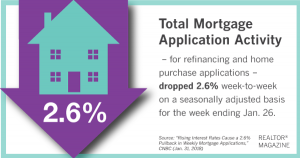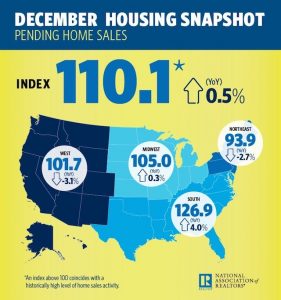
HAPPY TUESDAY
Airbnb Income Counts Toward Refinancing
With the backing of Fannie Mae, home-sharing giant Airbnb has announced a new partnership with select lenders, including Quicken Loans, Citizens Bank, and Better Mortgage, that will allow homeowners to report rental earnings as part of their income when applying to refinance a mortgage. Owners who rent rooms on Airbnb had been facing delays, higher interest rates, and loan limitations when refinancing.
“This initiative was developed to identify new ways of recognizing home-sharing income, making it possible for homeowners to maximize their investment to better reach their financial goals,” Airbnb said in a statement. “The project is part of Fannie Mae’s work to find new, innovative ways to expand the availability of affordable mortgage credit.”
If the initial program goes well, Fannie Mae may consider extending it to all of its lenders, according to reports. Airbnb will provide hosts with a proof of income statement that they can use when refinancing an existing mortgage.
Housing studies show mixed results when it comes to the effect of Airbnb on local markets. Some show that a greater number of Airbnb listings in a given location can lead to a slight increase in rents and home prices. Others, however, suggest Airbnb restricts long-term rent growth. Some cities, such as Baltimore and Detroit, are considering new zoning requirements to limit Airbnb rentals in its communities.
Source: Airbnb and “Refinancing a Mortgage? You Can Now Count Airbnb Income,” Curbed.com (Feb. 9, 2018)
Daily Real Estate News | Monday, February 12, 2018
HELLO MONDAY
Utility Bills May Be Getting Cheaper
Utility companies will pay less tax from a recent tax overhaul, and many are planning to pass those savings on to customers. Rate changes may shave a few dollars off the average customer’s bill in the coming months, The Wall Street Journal reports.
The federal government slashed its corporate tax rate from 35 percent to 21 percent. Regulated gas and electric utilities will have to pay less tax, and some state authorities may give regulated utilities little choice but to return that tax savings to its customers, WSJ reports.
Some regulated utilities will be refunding some of the tax payments they collected from customers based on the 35 percent rate. Companies may choose to issue refunds over several years, so the savings may be minimal for customers.
For example, National Grid U.S., a utility holding company with subsidiaries in New York, Massachusetts, and Rhode Island, expects a non-cash tax credit of $2 billion in 2018 from the lower tax rate. “It’s going to be returned to customers over a period of 20 to 30 years,” Peggy Smyth, the company’s finance chief, told The Wall Street Journal.
Some companies are using the tax savings to defray higher costs and prevent having to hike bills. For example, Florida Power & Light said it plans to use its savings to pay for $1.3 billion in recovery costs from Hurricane Irma. Customers may not see any reduction in utility bills, but it will spare them from any increases, the company said.
Duke Energy Corp, with subsidiaries in North Carolina, is in the process of requesting permission from local authorities to cut retail rates or use its tax savings to defray the cost of storm-related recovery efforts, WSJ reports.
“Tax reform has presented us a unique opportunity to reduce customer bills in the near term, while also helping to offset future rate increases,” says Steven Young, Duke Energy’s finance chief.
Source: “As Utilities Move to Pass Tax Savings to Customers, Credit Concerns Arise,” The Wall Street Journal (Feb. 7, 2018)
Daily Real Estate News | Thursday, February 08, 2018
Perrella Home Show
Perrella Home Show
Save the Date – March 3, 2018
New Location – Hibbing Memorial Building
For Information Email info@perrella.com
HAPPY WEDNESDAY
Will Rising Mortgage Rates Hurt Spring Sales?
Mortgage rates are steadily rising, and some housing analysts are already forecasting an impact on the market from the higher borrowing costs.
Heading into the spring buying season, the supply of homes remains at record lows, which presses home prices higher throughout the country. But as buyers face higher mortgage rate costs, will that prompt them to pause?
Mortgage rates were near record lows for most of 2017, but they’ve been on the rise ever since the new year. The average rate on the popular 30-year fixed-rate mortgage is up a quarter of a percentage point since the first week of the year, and rates have increased for the past four consecutive weeks. Freddie Mac reported last week the average on a 30-year fixed-rate loan was 4.22 percent. (Read more: Fed Move Doesn’t Suppress Mortgage Rates)
As the Federal Reserve prepares to raise its benchmark rate in the coming months, mortgage rates are expected to move higher, too. Mortgage rates are loosely tied to the yield on the U.S. 10-year Treasury.
Some homeowners may be less inclined to sell because they don’t want to lose their current record low rates that they secured after the recession. Some buyers, however, may want to move faster before rates rise even more and they face higher prices.
Lawrence Yun, chief economist of the National Association of REALTORS®, predicts that mortgage rates will reach 4.5 percent by the second half of the year.
Some home shoppers may be in a rush to lock in rates before those edge up even more.
“The increases that we’ve seen so far have only gotten people off the couch and into the market,” Glenn Kelman, CEO of Redfin, told CNBC in late January. “People are worrying that they need to hurry and buy a house now before rates go up further.”
Source: “Rising Mortgage Rates Could Mean Even Fewer Homes for Sale This Spring,” CNBC (Jan. 19, 2018)
Daily Real Estate News | Tuesday, February 06, 2018
THINKING THURSDAY
Rising Rates Cause Loan Demand to Teeter
Mortgage rates were on the rise for the second consecutive week, causing some borrowers to show reluctance. Total mortgage application activity—which reflects both refinancing and home purchase demand—dropped 2.6 percent last week, the Mortgage Bankers Association reported Wednesday. Nevertheless, mortgage volume remains 6.6 percent higher than the same week a year ago.
“Rates moved higher last week driven by concerns over a weaker U.S. dollar, signs of more robust growth and rising rates abroad, and moderately strong fourth-quarter domestic growth,” says MBA economist Joel Kan.

Broken out, applications to refinance a home loan dropped 3 percent during the week, but are still 3 percent higher than a year ago. Refinancing applications tend to be more sensitive to rate changes than home buying applications. Applications to buy a home also dropped 3 percent last week, but remain 10 percent higher than a year ago.
The MBA reported that the average 30-year fixed-rate mortgage rate was 4.41 percent last week, the highest level since March. The 15-year fixed rate and the FHA rate were at their highest levels since 2011 and 2013, respectively.
Source: “Rising Interest Rates Cause a 2.6% Pullback in Weekly Mortgage Applications,” CNBC (Jan. 31, 2018)
Daily Real Estate News | Wednesday, January 31, 2018
HAPPY HUMP DAY EVERYONE
Housing Market Starts 2018 on Positive Note
Contract signings on home sales rose slightly in December, reaching their highest level since last March, the National Association of REALTORS® reported Wednesday. NAR’s Pending Home Sales Index, a forward-looking indicator based on contract signings, moved 0.5 percent higher to a reading of 110.1 last month, 0.5 percent higher than a year ago.
“Another month of modest increases in contract activity is evidence that the housing market has a small trace of momentum at the start of 2018,” says Lawrence Yun, NAR’s chief economist. “Jobs are plentiful, wages are finally climbing, and the prospect of higher mortgage rates are perhaps encouraging more aspiring buyers to begin their search.”
But Yun cautions that these positive indicators won’t necessarily equate to a stronger sales pace in the long run: “Buyers throughout the country continue to be hamstrung by record-low supply levels that are pushing up prices—especially at the lower end of the market.”
The imbalance in supply and demand in housing throughout the country prompted home prices to appreciate 5.8 percent in 2017, which marks the sixth consecutive year of gains at or above 5 percent, NAR reports. Yun does expect price growth to subside in 2018, with some states possibly experiencing a decline due to the changes in the impact of the mortgage interest deduction and state and local deductions under the new tax law.
“In the short term, the larger paychecks most households will see from the tax cuts may give prospective buyers the ability to save for a larger down payment this year, and the healthy labor economy and job market will continue to boost demand,” Yun says. “However, there’s no doubt the nation’s most expensive markets with high property taxes are going to be adversely impacted by the tax law. Just how severe is still uncertain, but with homeownership now less incentivized in the tax code, sellers in the upper end of the market may have to adjust their price expectations if they want to trade down or move to less expensive areas. This could in turn lead to both a decrease in sales and home values.”

Source: National Association of REALTORS®
Daily Real Estate News | Wednesday, January 31, 2018
New associate announcement — Matt Rengstorf.

Perrella & Associates is pleased to announce its newest associate, Matt Rengstorf.
Matt is a Hibbing native, and has spent most of his life on the Iron Range. Whether it be friends, family or business acquaintances, he likes spending time with people, and is well connected within the community. In his free time, he enjoys sports – both playing and watching them.
Matt is joining Perrella and Associates as a licensed real estate agent, and is also taking on part of the business and office management within the agency. He is very adept at working with people, and is looking forward to helping clients and customers with all their real estate needs. You may contact him by calling Perrella & Associates at (218) 262-5582 or on his cell phone at (218) 295-2240.
Perrella Home Show
Perrella Home Show
Save the Date – March 3, 2018
New Location – Hibbing Memorial Building
For Information Email infor@perrella.com
HAPPY FRIDAY EVERYONE!!!
Protecting Privacy Is Good for Business
Concerns about data security and privacy are deepening as the real estate industry is increasingly being targeted by hackers. As personal and financial information is increasingly transmitted via email and between devices, it’s imperative that real estate professionals protect themselves and their clients from scams or data breaches.
This weekend, on Jan. 28, the National Cyber Security Alliance is observing Data Privacy Day by partnering with leaders in industry, government, and nonprofit sectors to educate businesses about the importance of respecting privacy and protecting personal information.
Read more: Don’t Be a Cybercrime Statistic
According to a J.D. Power and Associates survey, 81 percent of Americans feel they have lost control over the way their personal data is collected. “Companies of all sizes and from all industries are continuously collecting enormous amounts of personal data. Consumers want to know how their personal information is collected and protected and with whom it is shared,” said Russ Schrader, the NCSA’s executive director. “In fact, respecting privacy is not only a protective measure, but also a smart strategy for enabling consumer trust and enhancing reputation and growth.”
As the world becomes increasingly connected and the internet continues to expand, think about the abundance of personal information collected on your devices and what could happen if that information is stolen and used in negative ways.
The NCSA has some tips for being more thoughtful concerning information you collect from clients, protecting that data, and fostering trust within your sphere.
If you collect it, protect it. Personal information is like money. Create a policy for you, agents on your team, or at your brokerage for taking reasonable security measures to protect individuals’ personal information from inappropriate and unauthorized access. This could include the following steps:
Secure your logins. Your usernames and passwords are not enough to protect key accounts like email, banking, and social media, according to the NCSA. Always turn on the strongest authentication tools available, such as biometrics, security keys, or a unique one-time code through an app on your mobile device.
Keep up with updates. Update your security software, web browser, and operating system to have the best defense against viruses, malware, and other online threats.
Be thoughtful with what you share. Consider what you’re posting online and who might see it. Regularly check your privacy and security settings on your social networks.
Secure your devices. Every device should be secured by a password or strong authentication—finger swipe, facial recognition, or other technique. These security measures limit access to authorized users only and protect your information if devices are lost or stolen.
Think before you app. Information about you, such as the games you like to play, your contacts list, where you shop, and your location, has tremendous value. Be thoughtful about who gets that information and understand how it’s collected through apps.
Read more: 9 Ways to Keep Data Secure
Be open and honest about how you gather, use, and share personal information: Clearly communicate your data-use practices and how you manage customers’ privacy. But don’t count on your privacy policy as your only tool to educate clients. Communicate clearly and often what privacy means to you or your brokerage firm, and the steps you take to achieve and maintain consumer privacy and security.
Create a culture that respects data security: Educate agents about their role in privacy, security, and respecting and protecting the personal information of customers.
“Every company must be able to demonstrate how it is protecting data privacy to earn the trust of customers, users, partners and employees. This takes a collaborative, risk-based data privacy practice that aligns with industry best practices, customer demands, and regulatory requirements,” said Michelle Dennedy, vice president and chief privacy officer for Cisco, a partner of the NCSA.
The NCSA has tips on how to check your various privacy settings, safety tips for mobile devices, and a #CyberAware monthly newsletter for families to share online safety news and resources, which you can share with your clients.
Additionally, the Federal Trade Commission has created a webpage that has advice to help small business owners protect not only the networks and systems that are the backbone of their business, but also their customers’ sensitive data. The website also includes videos that show steps small-business owners can take to ensure their businesses have secure networks.
—Erica Christoffer, REALTOR® Magazine
Daily Real Estate News | Thursday, January 25, 2018


